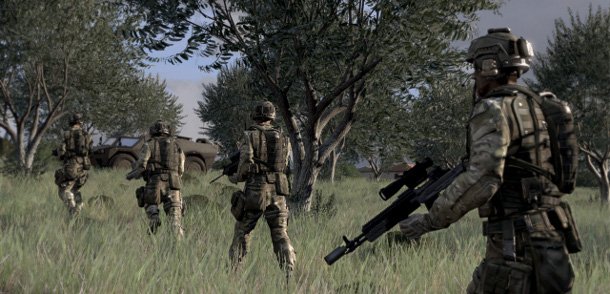Interview: Bohemia Interactive's CEO on fighting piracy, creative DRM

PCG: What about always-online platforms, a la Blizzard's StarCraft II and Diablo III? Do you think those fall under the umbrella of "punishing legitimate customers for hackers/cheaters/pirates' crimes"?
MS: I don't see it this way. However, I still prefer a game to run without any type of Internet connection requirement, as it's really worrying that games may stop functioning at all just because running the central service is no longer viable commercially, or even because your Internet went down in a thunderstorm, etc. People still play and mod our 10-year-old game, and hopefully some will even continue to do so 10 years into the future. While systems and companies may fail over time, great games should last forever.
PCG: A few companies have actually claimed that, nowadays, developers' best bet is to work with piracy - not against it. Torchlight, for instance, got most of its recognition in China thanks to pirates . It seems like, to some extent, DEGRADE does that too. Players get a small taste of the full game before it turns to goopy mush. Is there any way of knowing how many sales you've gotten from players who tried a pirated version of a game, said, "Wow, that was fun," and then paid to keep playing?
MS: It's very rare to find people admitting to using pirated versions, so I'm unable really to share any figures here. But recognition is not too important, unless you see conventional PC games as a marketing tool for other commercial ventures and not commercially viable businesses on their own. We're trying to make users of pirated copies experience some limitation, make their version closer to a real trial version. As they often claim to be pirating games for trialling purposes only, we try to make sure it works that way.
PCG: Some developers and pundits, however, claim that pirates simply aren't legitimate customers. That is to say, if all piracy were eliminated forever, those people would opt to simply not play games instead of buying them. Do you think that's true, or is it just an excuse to avoid confronting a larger issue head-on?
MS: Certainly, not all users of pirated copies would turn into customers. However, if only five percent of these would buy the game instead, the legitimate user base may double or even triple. From this perspective, finding ways to have games pirated less is probably more important than the quality of the game itself.
PCG: So there's tons of doom and gloom, and then there's CD Projekt. The Witcher 2's digital version apparently sold quite well , and here's the kicker: The GOG.com version didn't have any DRM whatsoever. As a result, CD Projekt's claiming that copy protection's not necessary. What do you think, though? Are they onto something, or is this the exception - not the rule?
Keep up to date with the most important stories and the best deals, as picked by the PC Gamer team.
MS: It's all relative. They sold the majority of their copies through Steam, where the title is still protected by Steam's own protection system. Plus, I would say their comment is overreaching. Of course their own store sells more copies than other independent online portals. It's the place where they directed their hardcore audience, as there was no real advantage for non-Steam users in choosing another digital portal of a similar nature. It would be surprising if the numbers are much different. We see similar trends with our own releases and DRM presence or absence seems to have little impact. So in a sense I agree with their point that conventional, copy-protection-based DRM is becoming a useless tool in addressing the piracy problem.
PCG: Thanks to issues like innumerable potential hardware configurations and piracy, many developers have made consoles their primary focus. That in mind, what makes PC so attractive to Bohemia? Why is it worth all the fuss?
MS: We consider the PC superior to other platforms, always on the cutting edge. But for us, an even more important aspect is a complete freedom of development and publishing on this platform. We're not very compatible with the corporate structure and processes required in the console or smart phone worlds. We prefer more agile methods with our users in the loop. Certification and approval by platform owner for a patch? Beg your pardon? We prefer if we can iterate together with our user base, and that may sometimes result in several patches released in one day, in the most extreme of cases. We like the dialog and interaction with our users that can be achieved only on PC. On the other hand, piracy is for sure more widespread on PC for the very same reasons, and that puts us into a very difficult position in sticking with conventional games on PC for the time being. We have to be extremely cost-cautious and developmentally effective to make it work.

